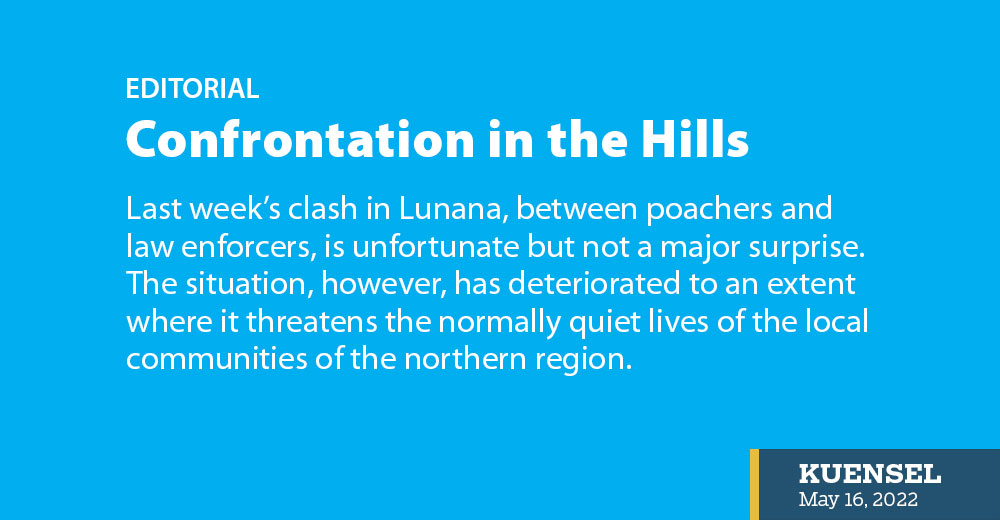Last week’s clash in Lunana, between poachers and law enforcers, is unfortunate but not a major surprise. The situation, however, has deteriorated to an extent where it threatens the normally quiet lives of the local communities of the northern region.
As facts go, the scenario is clear. Bhutan’s pristine mountains are home to numerous medicinal plants, among them the extremely lucrative cordyceps. The highland communities follow a long-upheld demarcation where they have the rights to harvest the cordyceps. Because of the attractive prices, people from other parts of the Bhutanese highlands poach cordyceps from outside their own localities. Law enforcers, normally forestry officers and some RBA soldiers who were recently asked to support helpless foresters, are struggling to enforce discipline over the rugged landscape.
The trends are also clear. Because of the value of the cordyceps, rising by the year, the highland communities have become visibly wealthier. This year is a fourth-year cycle of the cordyceps, and therefore a bumper harvest of the plant which is expected to earn more than Nu 2.00 million a kilogramme. Poachers are currently scouring the mountain slopes of the fertile Lunana hills, violating community discipline and the law.
The situation is exacerbated by a number of conditions. Bhutan has entered the 21st century as a Nation State but some of our communities still live by the laws of the rugged terrain. In this case, rawboned herdsmen, who are now functioning in groups, did not hesitate to clash with government law enforcers. The exchange resulted in bloodshed on both sides and, sadly, one death. Foresters and even highlanders who have the legal rights to collect cordyceps have fled the area, fearing for their lives.
Another notable trend is that the poachers have supporters who are uncharacteristically adept in the use of social media. This means that there are individuals who have the skills to stir up people but not the sophistication to respect the common good.
The government faces a dilemma. It is difficult to see poachers suddenly regretting their behaviour and going home. In fact, they are encouraged by support in social media. On the other hand, the government cannot go in with guns blazing, be they defiant poachers or unreasonable groups of people. It is not the Bhutanese style of governance.
The bottom line is that the value of the cordyceps will not reduce; neither will the demand, the poaching, and tensions. Which also means that, if not nipped in the bud, it can escalate into a long-term problem for all our highland communities. It forces Bhutan, as a society, to confront the challenges to the values of Gross National Happiness which warns against disorder being driven by greed.
The first line of responsibility falls on local leaders who have been elevated to positions of government with increased authority and benefits. Their mandate, in this day and age, is to refine community management as a part of national governance. They can be central forces in finding the solution. We have the central government. Then we have our arms of government like the forest, livestock, plant, and agriculture specialists who serve the people. We also have a parliament and government elected by the people. As a last resort we have law enforcers.
With such a system in place it is time to discuss the situation face to face to work out a solution. His Majesty The King has advised that advised it is not the disagreements that our people should be concerned about. It is the manner in which they are resolved… all problems may be resolved without being allowed to fester and grow. Such shared effort will be in the true spirit of Gross National Happiness.


